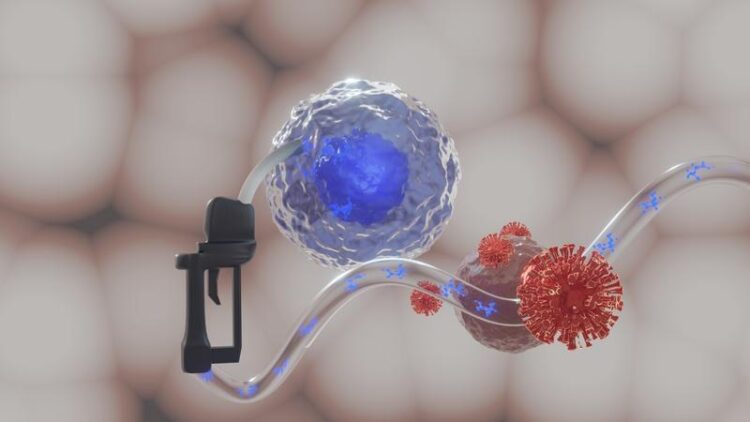Covid-19: New energy for flagging immune cells

When T cells (blue-white sphere) fill up with energy in the form of ketone bodies (blue), they can fight viruses more effectively.
© Chantal Wientjens, AG Prof. Wilhelm / University of Bonn
In severe Covid-19 patients, the metabolism produces insufficient amounts of certain energy-rich compounds called ketone bodies. However, these energy carriers are needed by two important cell types in the immune system in order to fight the virus effectively. Perhaps this finding explains why some people fall ill so much more severely than others. A study led by the University of Bonn at least points in this direction. The results have now been published in the journal Nature. They also give hope for new therapies.
When we fall ill, we often lose our appetite. This also has an effect on our metabolism: since it is no longer as well supplied with carbohydrates, it switches to burning fat. This creates energy-rich molecules called ketone bodies. And these may help our body to cope better with viruses.
At least that is what the results of the current study suggest. “We found that patients with influenza infections produce ketone bodies in considerable quantities,” explains Prof. Dr. Christoph Wilhelm from the Institute of Clinical Chemistry and Clinical Pharmacology at the University Hospital Bonn, who is also a member of the Immunosensation2 Cluster of Excellence at the University of Bonn. “In contrast, we saw hardly any increase in Covid-19 patients, at least in those with a moderate or severe course.”
In addition, it was striking that those infected with the coronavirus had lower levels of inflammatory messengers in their blood. This was particularly true for interferon-gamma. This is a cytokine secreted by a specific group of immune cells, the T-helper cells. These cells use it to summon the help of phagocytes and other defense troops of the immune system to fight viruses. For efficient production of IFN-gamma, however, the helper T cells apparently require an adequate supply of ketone bodies. If this is lacking, they produce less interferon-gamma. In addition, the helper T cells then die earlier.
Ketone bodies make immune system more powerful
The researchers also saw similar effects in another important group of immune cells, the killer T cells. “They too need ketone bodies to function well and effectively eliminate the virus,” says Dr. Christian Bode, lecturer at the Department of Anesthesiology and Surgical Intensive Care Medicine at the University Hospital Bonn. Apparently, the ketone bodies promote the function of mitochondria, metabolic power houses fueling the immune cells. This not only ensures improved energy production, but also provides molecules that are needed for interferon production.
“Without an adequate supply of ketone bodies, on the other hand, the killer T cells and helper T cells show signs of exhaustion,” Bode explains. “In this depleted state, they can no longer perform their function adequately.” However, the researchers were able to revive the immune cells by placing diseased mice on a ketogenic diet (a diet low in carbohydrates and protein) or by administering ketone bodies directly. The animals then succeeded better in eliminating the virus and also developed significantly less lung damage.
Hope for new treatment options
The results therefore also raise hope for new treatment options. “It may be possible to increase the power of the body’s own defenses through a targeted change in diet,” says Wilhelm. “Whether this really works must now be shown by further studies.” The researchers expressly advise against self-experimentation with dietary supplements or diets – these could possibly do more harm than good.
The new findings could also be relevant for other infections. In the medium term, they may even contribute to new strategies to help the body fight tumors.
Participating institutions and funding:
In addition to the University Hospital and the University of Bonn, the TU Braunschweig and the University Hospitals of Hannover, Zurich, Nijmegen and Essen were involved in the study. The study was funded by the German Research Foundation (DFG), the German Federal Ministry of Education and Research (BMBF), the European Research Council (ERC), and the Netherlands Organization for Scientific Research (NWO).
Wissenschaftliche Ansprechpartner:
Prof. Dr. Christoph Wilhelm
Institute of Clinical Chemistry and Clinical Pharmacology University Hospital Bonn
Phone: +49 (0)228/287-51721
Email: cwilhelm@uni-bonn.de
Privatdozent Dr. Christian Bode
Department of Anesthesiology and Surgical Intensive Care Medicine
University Hospital Bonn Phone: +49 (0)228/281-14119
Email: Christian.Bode@ukbonn.de
Originalpublikation:
Fotios Karagiannis et al.: Impaired ketogenesis ties metabolism to T cell dysfunction in COVID-19. Nature; https://doi.org/10.1038/s41586-022-05128-8
Media Contact
All latest news from the category: Life Sciences and Chemistry
Articles and reports from the Life Sciences and chemistry area deal with applied and basic research into modern biology, chemistry and human medicine.
Valuable information can be found on a range of life sciences fields including bacteriology, biochemistry, bionics, bioinformatics, biophysics, biotechnology, genetics, geobotany, human biology, marine biology, microbiology, molecular biology, cellular biology, zoology, bioinorganic chemistry, microchemistry and environmental chemistry.
Newest articles

Hyperspectral imaging lidar system achieves remote plastic identification
New technology could remotely identify various types of plastics, offering a valuable tool for future monitoring and analysis of oceanic plastic pollution. Researchers have developed a new hyperspectral Raman imaging…

SwRI awarded $26 million to develop NOAA magnetometers
SW-MAG data will help NOAA predict, mitigate the effects of space weather. NASA and the National Oceanic and Atmospheric Administration (NOAA) recently awarded Southwest Research Institute a $26 million contract…

Protein that helps cancer cells dodge CAR T cell therapy
Discovery could lead to new treatments for blood cancer patients currently facing limited options. Scientists at City of Hope®, one of the largest and most advanced cancer research and treatment…



